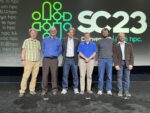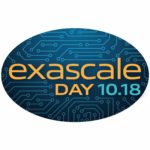On Wednesday, Feb. 28, the Argonne Leadership Computing Facility will hold a webinar from 11 am-noon CT on the compute blade of the Aurora exascale supercomputer. Registration for the event can be found here. Led by ALCF’s Servesh Muralidharan, the session will cover details of the blade’s components, and the flow of data between them, […]
HPC User Forum Announces Agenda for April 9-10 Event in Reston, VA
ST PAUL, Minn., February 12, 2024— The HPC User Forum, established in 1999 to promote the health of the global HPC industry and address issues of common concern to user, has published an updated agenda spotlighting its list of featured speakers for its upcoming meeting, on Tuesday and Wednesday, April 9-10 at the Hyatt Regency […]
Eviden to Deliver Modular Data Center for Europe’s 1st Exascale System
This morning, Eviden made it official: it has been awarded a contract by Jülich Supercomputing Centre in Germany to build the modular data center to host the EuroHPC JUPITER supercomputer, Europe’s first exascale system. This is not surprising because….
EQSIM and RAJA: Enabling Exascale Predictions of Earthquake Effects on Critical Infrastructure
Nearly 120 years ago, the great San Francisco earthquake of 1906 provided a stark and sobering view of the havoc that can be caused by the sudden and violent movement of Earth’s tectonic plates. According to USGS, the rupture along the San Andreas fault extended 296 miles (447 kilometers) and shook so violently that the […]
LLNL-led SCREAM Team Clinches Inaugural Gordon Bell Prize for Climate Modeling
A Lawrence Livermore National Laboratory (LLNL)-led effort that performed an unprecedented global climate model simulation on the world’s first exascale supercomputer has won the first-ever Association for Computing Machinery (ACM) Gordon Bell Prize for Climate Modelling, ACM officials announced Thursday. The Simple Cloud Resolving E3SM Atmosphere Model (SCREAM) team, led by LLNL staff scientist Peter Caldwell and […]
A New Day for the TOP500: Aurora No. 2 at 585 PFlops, 4 New Top 10 Entrants, Frontier Still No. 1
Denver — Attendees at the SC23 conference here in Denver have been greeted by a roiled TOP500 ranking of the world’s most powerful supercomputers, along with significant news about a would-be exascale HPC system coming in at no. 2 on the list….
Gina Tourassi Named Oak Ridge Associate Lab Director for Computing and Computational Sciences
Gina Tourassi has been named associate laboratory director for Computing and Computational Sciences Directorate (CCSD) at Oak Ridge National Laboratory. She replaces Shaun Gleason, interim ALD since the departure of Doug Kothe for Sandia National Laboratories last June. Kothe….
Aurora Exascale Install Update: Cautious Optimism
The twice-annual TOP500 list of the world’s most powerful supercomputers is not universally loved, arguments persist whether the LINPACK benchmark is an optimal way to assess HPC system performance. But few would argue it serves a valuable purpose: for those installing leadership-class supercomputers, the TOP500 poses a challenge and a looming deadline that “concentrates the mind wonderfully.”
Exascale Day 2023: The Exascale Computing Era Is Here.
With the delivery of the U.S. Department of Energy’s (DOE’s) first exascale system, Frontier, in 2022, and the upcoming deployment of Aurora and El Capitan systems by next year, researchers will have the most sophisticated computational tools at their disposal to conduct groundbreaking research. Exascale machines can perform more than a billion billion calculations per […]













